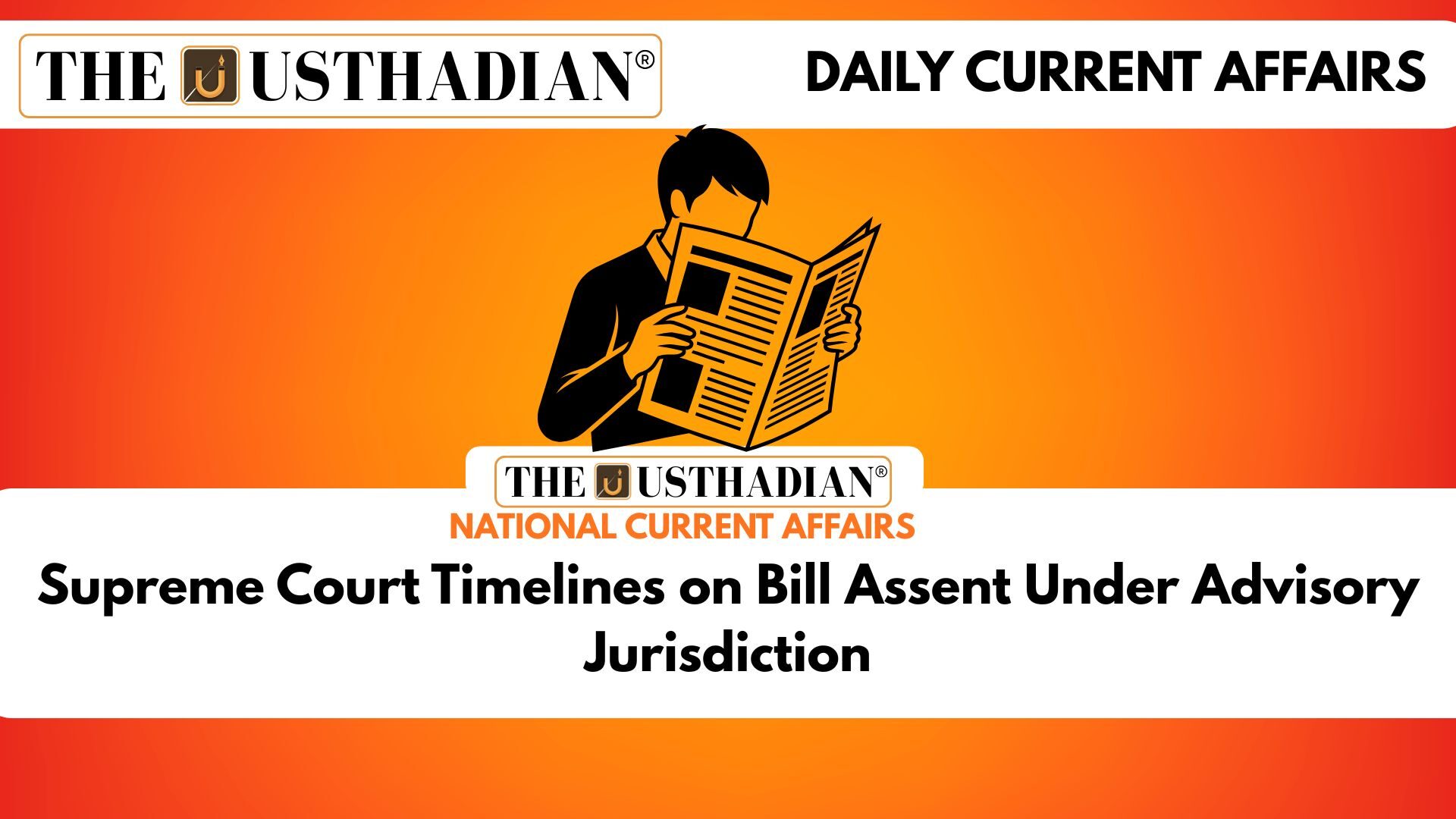Presidential Reference Reaches Supreme Court
Supreme Court Timelines on Bill Assent Under Advisory Jurisdiction: On July 22, 2025, a Constitution Bench of the Supreme Court of India will hear a crucial presidential reference under Article 143. This follows an earlier April 8, 2025 verdict, which fixed a three-month deadline for the President to act on state Bills reserved by Governors. President Droupadi Murmu has now sought the Court’s advisory opinion to clarify the legal standing and timelines for giving or withholding assent to such Bills.
What is Article 143 Advisory Jurisdiction
Article 143 empowers the President to request the Supreme Court’s opinion on legal or factual issues of public importance. This advisory jurisdiction is non-binding, meaning the President is not legally obligated to follow it. However, it serves as a constitutional guidepost during unclear or complex situations. The opinion must be delivered by a minimum five-judge Bench.
Static GK fact: The Supreme Court first used Article 143 in 1951 in the Delhi Laws case, to determine Parliament’s powers to delegate legislation.
April 8 Verdict That Triggered the Reference
In a key ruling, a two-judge Bench ruled that the President must act within three months on Bills sent for assent after Governors’ clearance. The judgment came after Tamil Nadu’s Governor delayed action on 10 state Bills, leading to concerns about misuse of gubernatorial discretion. The verdict allowed states to file writ petitions against delays by the President, triggering a wider legal and political debate.
Static GK Tip: Under Article 200, Governors may withhold assent or reserve Bills for the President’s consideration, but the Constitution sets no clear timelines.
Scope of Questions Before the Bench
The presidential reference includes 14 legal questions, including those arising directly from the April 8 judgment. The Court is expected to clarify whether smaller Benches can decide constitutional matters or whether only larger Benches must be used. The reference also involves Article 131, related to original jurisdiction in Centre-state disputes, and Article 142, which allows the Court to pass orders for complete justice.
Historical References Under Article 143
The Supreme Court has been approached under Article 143 approximately 15 times since 1950. Notably, in 1993, the Court declined to provide an opinion on the Ram Janmabhoomi issue as it was under active litigation. The advisory route cannot be used to review or override existing Supreme Court judgments.
Political Backdrop and Centre-State Tensions
This issue reflects a deepening conflict between the Centre and Opposition-led states. Governors, appointed by the Centre, have been accused of delaying state Bills to curb legislative independence. The Supreme Court’s involvement seeks to uphold the democratic mandate while reinforcing constitutional checks and balances.
Judiciary vs Parliamentary Supremacy
The verdict has reignited a debate on separation of powers. Vice President Jagdeep Dhankhar has criticised judicial timelines imposed on the President, warning of judicial overreach. Others argue that the judiciary plays a necessary role in ensuring that governance does not stall due to political manoeuvring.
Static GK fact: The Kesavananda Bharati case (1973) established the basic structure doctrine, limiting Parliament’s power to amend the Constitution beyond core democratic principles.
Static Usthadian Current Affairs Table
Supreme Court Timelines on Bill Assent Under Advisory Jurisdiction:
| Topic | Detail |
| Article 143 | President may seek SC’s advisory opinion on law or facts |
| Constitution Bench | At least 5 judges required for advisory jurisdiction |
| April 8, 2025 Verdict | Mandated 3-month deadline for President’s assent to Bills |
| Article 200 | Allows Governors to reserve Bills for President |
| Tamil Nadu Governor Case | Triggered ruling by withholding assent to 10 Bills |
| Article 142 | SC can pass any order to ensure complete justice |
| Article 131 | Grants original jurisdiction for Centre-state disputes |
| Advisory Jurisdiction History | Invoked around 15 times since 1950 |
| Ram Janmabhoomi Reference | Declined by SC due to ongoing civil dispute |
| Kesavananda Bharati Case | Defined limits on Parliament’s power to amend Constitution |








